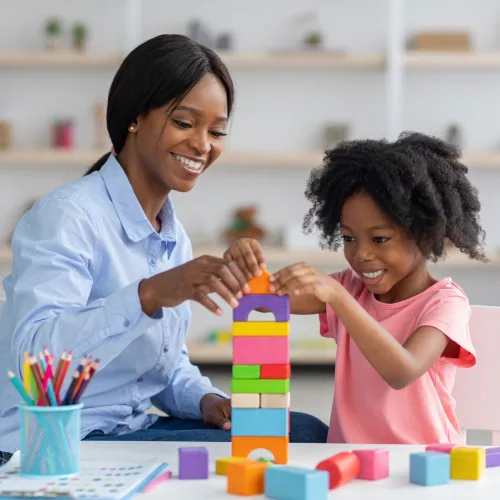The Co-Parent's Guide to Moving On After Divorce

Grief is one of the most universal of experiences. Whether through illness, the end of a relationship, or the death of a loved one, it's a rare lifetime that isn't touched in some way by a profound loss.
Accompanying most help topics on grief is the concept of moving on, of finding a way to process the loss so that we may get some semblance of normalcy back into our lives. But when you separate as parents, this process of moving on after divorce can quickly become jammed up by the need to still raise your children together after the split.
It's unsurprising that grief has a significant impact on our physical, mental, and emotional states. As such, it's important to be able to cope with tough emotions so you can still meet your daily responsibilities. Although everyone's journey will be individual, there are a few techniques parents can use to process the end of their relationship while still working to transition into co-parenting.
Be Kind to Yourself
Getting divorced is a monumental change, and it's accompanied by a whole host of smaller changes that can take you by surprise for a long time after everything is finalised. Beyond having to adjust to your parenting schedule and newly-single status, it's also possible that you're moving, that your relationships with friends are changing, or that you no longer live with your family pets. All those changes, big and small, can lead to life after divorce feeling incredibly disorienting.
It's no wonder that you're not going to be 100% after divorce. And no one's expecting you to be, either. It can be a relief to hear about other people's similar experiences with divorce and healing, but it's vital that you not measure the strength and success of your own efforts against other people's histories.
Parents can begin co-parenting with varying levels of grief over their former relationships. Some may process the change during the divorce, while others might have reached a point of acceptance before divorce proceedings even began. Other still may be hit with a fresh wave of raw emotions once everything has been finalised. No matter your situation, it's important to understand that there's no normal progression through grief.
You may encounter all five of the different stages of grief—denial, anger, bargaining, depression, and acceptance—that were popularised by psychiatrist Elisabeth Kubler-Ross in the 1960s. Or you may only encounter a few. It's also possible to find that your journey looks nothing like the grief models encountered in self-help books or online. It's natural to wonder what to do after a divorce, but do not despair if your own process doesn't look exactly like the next person's.
Try Parallel Parenting
Parallel parenting—a shared parenting strategy that allows parents to disengage from each other while still playing active roles in their children's lives—may be a suitable strategy for parents struggling to process their divorce. More traditional co-parenting necessitates parents have regular contact and assumes that they are able to have productive and positive interactions with one another.
But when processing the end of a relationship, this continued contact can reopen old wounds and slow the overall healing process.
Parallel parenting prevents this by limiting the amount of direct contact between parents through highly detailed parenting plans. Parents consult the parenting plan with their questions rather than hashing out details with each other in the moment. This decreased contact can allow parents to settle into their new routine a little more smoothly.
Many people are discouraged by the business-like nature of parallel parenting. Some feel disappointed that they are unable to engage in the type of co-parenting relationship they see online or in the media. If you have similar feelings, it's important to remember that parallel parenting can be approached as a transitional strategy. Understanding your own limitations at the beginning of your shared parenting journey, and planning accordingly, can lead to a stronger co-parenting relationship once you are able to engage with your former partner in a healthy manner.
Maintain Friendships
It's common for people to withdraw during a divorce, both from their normal routines and their existing relationships. This can be a detriment to the recovery process, however, as doing so can lead to increased feelings of isolation and loss.
Instead, make a concerted effort to talk with and see the people who are most important to you. It can be as simple as having a standing date with a best friend or sibling, such as going to a movie every third Sunday. While friends and family can provide a sympathetic ear or shoulder to cry on, they can also be a welcome distraction from woeful feelings.
Prioritise Self-Care
Too often, parents let their own needs get pushed to the bottom of the to-do list during a divorce or separation. Your lawyer may be presenting you with countless tasks, your children will invariably need extra support, and you may be simultaneously looking for new housing, healthcare, childcare, and more.
It's no wonder that self-care gets delayed when there are so many pressing and important tasks that need your attention.
But in order to take care of others and stay on top of your responsibilities, you'll need to take care of yourself first.
Self-care doesn't need to be a whole production. Taking small snippets of time to enjoy your favourite beverage, read a chapter of the latest bestseller, or learning a new hobby can help you get the energy you need to face larger tasks. Even a short walk can do a tremendous amount of work when it comes to self-care, and it's a low-stress option because it is free, customisable to any schedule, and has been shown to boost creative thinking and memory.
Get a Fresh Perspective
An extension of self-care is allowing yourself to enlist the help of others. Close friends and family members are great to lean on for emotional support and advice, but it's important to recognise if you're beginning to repeatedly rehash the same topics about your divorce or separation with them. Discussions that lead to a refined understanding of your mindset are beneficial, but when discussions become exercises in negativity, they can have a profound effect on your outlook and ability to think of positive solutions.
So if you find your thinking has become stagnant, it might be time to get an outside perspective. If you're able to work with a mental health professional, take advantage of that opportunity, as they can provide some much-needed help in processing the end of your relationship in a healthy way.
Life After Divorce
There's no one right way to moving on after divorce. During the early days, your feelings may change from week to week, and you shouldn't aim for perfection immediately after your divorce. Give yourself time to adjust, perhaps by engaging in parallel parenting, and reassess how you feel about your co-parenting relationship after some time has passed.
By taking care of yourself, both through engaging in activities that bring you joy and by maintaining the friendships that are important to you, you'll be better equipped to approach situations with a positive attitude and provide your children with proper support. Eventually, the growing pains will stop, you'll settle into your new life, and you'll once again be able to fill it with many happy moments and memories.







